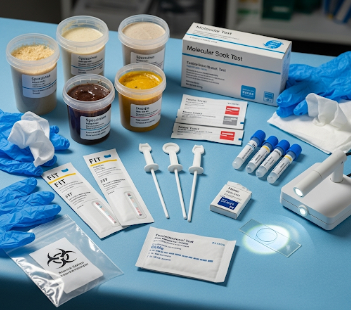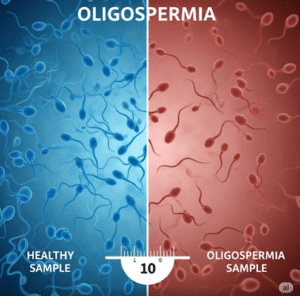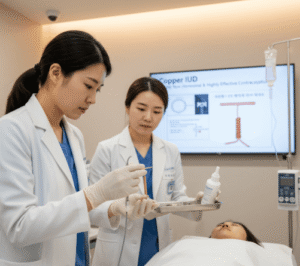Overview
Stool tests are laboratory examinations of fecal samples used to diagnose infections, digestive disorders, and gastrointestinal diseases. These tests help detect bacteria, viruses, parasites, blood, and malabsorption issues in the digestive tract.
In Korea, stool testing is offered in advanced clinical laboratories and hospitals, using state-of-the-art diagnostic tools. Patients benefit from accurate results, rapid turnaround times, and comprehensive analysis for gastrointestinal health monitoring.
What is a Stool Test?
A stool test involves analyzing a small sample of feces to detect abnormal substances or microorganisms. It can identify:
- ✦ Bacterial infections: Salmonella, E. coli, Clostridium difficile.
- ➤ Parasitic infections: Giardia, Entamoeba histolytica.
- ✦ Viral infections: rotavirus, adenovirus.
- ➤ Blood in stool: indicating ulcers, hemorrhoids, or colorectal cancer.
- ✦ Digestive function: fat malabsorption, pancreatic insufficiency, or bile acid issues.
Tests may include microscopy, culture, antigen testing, PCR (molecular testing), and chemical analysis depending on the diagnostic need.
What are the Benefits?
Stool tests provide several key advantages:
✅ Early detection of infections – allowing timely treatment.
➤ Monitoring digestive health – identifies malabsorption, inflammation, or chronic conditions.
✦ Screening for colorectal issues – detects hidden blood or early signs of colorectal cancer.
➤ Non-invasive and simple – no needles or surgical procedures are required.
✅ Guides treatment decisions – helps doctors prescribe appropriate medications.
✦ Supports overall gastrointestinal health – useful for chronic diarrhea, constipation, or abdominal pain evaluation.
Procedure Details
1) How should I prepare for Stool Tests?
Preparation depends on the type of stool test:
- ✦ Dietary restrictions: some tests may require avoiding red meat, iron supplements, or certain medications.
- ➤ Bowel preparation: for specific tests like fecal occult blood, follow instructions for proper sample collection.
- ✦ Sample collection kit: usually provided by the clinic or lab.
- ➤ Hygiene and storage: wash hands before and after collection; store the sample as instructed (refrigeration may be required).
- ✦ Provide relevant medical history: symptoms, medications, recent travel, or antibiotic use.
- ➤ Follow instructions carefully: improper sample collection can affect test accuracy.
2) What happens during the procedure Stool Tests?
The procedure is simple and non-invasive:
➤ Step 1: Patient collects a small stool sample using the provided kit.
✦ Step 2: The sample may be placed in a container with preservative for certain tests.
➤ Step 3: Sample is labeled and delivered to the laboratory promptly.
✦ Step 4: Laboratory analysis begins, which may include:
- Microscopic examination for parasites or cells.
- Culture to identify bacteria.
- Antigen or PCR testing for viruses and bacteria.
- Chemical analysis for blood, fat, or other substances.
➤ Step 5: Results are compiled, reviewed by a physician, and interpreted in the context of the patient’s symptoms.
The collection process is painless, quick, and can be done at home for most tests.
3) What happens after a Stool Test?
Post-test care and interpretation include:
- ✦ Receiving results: typically within a few days depending on the type of test.
- ➤ Discussion with doctor: understanding results, implications, and next steps.
- ✦ Treatment if required: antibiotics, antiparasitic medications, or dietary changes.
- ➤ Follow-up tests: may be recommended to ensure resolution of infection or improvement in digestive function.
- ✦ Lifestyle guidance: hydration, dietary adjustments, and preventive measures for gastrointestinal health.
- ➤ Monitoring: chronic or recurring symptoms may require repeated testing or additional investigations.
Risks / Benefits
Potential Risks:
- ✦ Minor discomfort during collection for some patients.
- ➤ Contamination of the sample if instructions are not followed.
- ✦ Anxiety while awaiting results.
- ➤ Rarely, improper collection may lead to misdiagnosis.
Benefits:
- ✅ Non-invasive and easy to perform.
- ✅ Early detection of infections and gastrointestinal disorders.
- ✅ Helps guide appropriate treatment and management.
- ✅ Supports long-term digestive and overall health monitoring.
Recovery and Outlook
Stool tests do not involve any invasive procedure, so recovery is immediate:
- ➤ No downtime: patients can resume normal activities immediately.
- ✦ Treatment: initiated only if an abnormality or infection is detected.
- ➤ Monitoring: additional follow-up may be recommended for chronic or severe conditions.
- ✦ Long-term outlook: early detection and treatment of infections or digestive issues lead to excellent prognosis and improved gastrointestinal health.
When To Call the Doctor
Contact your healthcare provider if you notice:
⚠ Persistent diarrhea, abdominal pain, or blood in stool.
⚠ Signs of dehydration (dry mouth, dizziness).
⚠ Fever or systemic symptoms with digestive issues.
⚠ Recurring digestive symptoms despite normal test results.
⚠ Questions regarding test results, medications, or dietary recommendations.
Best Korea Option / Process
Korea provides world-class stool testing services with:
- ✦ Modern diagnostic laboratories using advanced microbiology and molecular techniques.
- ➤ Accurate and rapid test results for bacterial, viral, parasitic, and chemical stool analysis.
- ✦ Home or clinic sample collection kits for patient convenience.
- ➤ Comprehensive interpretation and follow-up care by gastroenterologists or infectious disease specialists.
- ✦ Affordable, accessible, and reliable testing for international and domestic patients.
- ➤ Multidisciplinary teams including lab technicians, physicians, and dietitians for optimal gastrointestinal health management.
Korea is a leading destination for stool testing, ensuring precise, quick, and comprehensive gastrointestinal assessment.
Highlights of Stool Tests in Korea
- ✅ Detects bacterial, viral, and parasitic infections.
- ➤ Non-invasive, painless, and simple to perform.
- ✦ Screens for blood, fat, and digestive disorders.
- ➤ Rapid results with professional medical interpretation.
- ✅ Supports treatment planning, prevention, and long-term gastrointestinal health.












